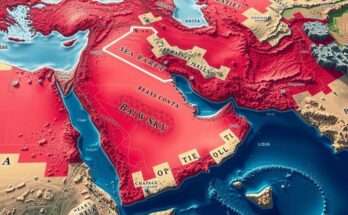The article discusses the pivotal meeting between President Biden and UAE President Mohamed bin Zayed al-Nahyan, emphasizing the strengthening of ties amid the Sudanese civil war. While the U.S. and UAE expressed concerns over the conflict, the UAE’s support for the paramilitary RSF was notably downplayed. This complex geopolitical context reveals tensions between humanitarian principles and strategic alliances as various international powers engage in Sudan for influence.
The visit of United Arab Emirates (UAE) President Mohamed bin Zayed al-Nahyan to the White House marked a significant moment in U.S.-Emirati relations, highlighting a strengthening partnership amid ongoing conflicts in the Middle East, particularly those in Gaza and along the Israeli-Lebanese frontier. The Biden administration announced various new avenues for cooperation with the UAE, including advancements in artificial intelligence, space initiatives, clean energy technologies, and military defense, designating the UAE as a “major defense partner,” a status previously accorded only to India. However, the discussions took a more complicated turn regarding Sudan’s civil war and the UAE’s role in exacerbating this conflict. A joint statement characterized the situation as alarming, expressing mutual concern and a commitment to end hostilities. Nevertheless, only a fraction of the statement addressed the UAE’s involvement in supplying support to the paramilitary group Rapid Support Forces (RSF), which have faced allegations of ethnic cleansing against the Black, non-Arab Masalit people in Darfur. The UAE’s backing of the RSF, led by Gen. Mohamed Hamdan “Hemedti” Dagalo, is particularly troubling, as they have allegedly provided the group with advanced weaponry and battlefield intelligence, purportedly under the guise of humanitarian aid. Historical parallels to the early 2000s atrocities in Darfur starkly emerge, with reports indicating summary executions and widespread gender-based violence perpetrated by the RSF. The conflict has devolved into a proxy showdown involving foreign powers, with the UAE opposing Iran’s backing of the Sudanese Armed Forces (SAF), led by Gen. Abdel Fattah al-Burhan. This geopolitical struggle sees nations like Russia and Iran vying for influence over Sudan’s critical Red Sea ports. Despite the U.S. administration aligning with the UAE as a moderating Arab state, President Biden also emphasized the need to cease military support for such factions in a subsequent address at the United Nations, calling for a unified global stance against those contributing to the violence. Ultimately, the Biden administration’s approach reflects a complex balancing act: while condemning the humanitarian crisis in Sudan, it simultaneously strengthens ties with a nation that plays a conflicted role in the ongoing crisis. This situation raises questions about the United States’ commitment to its principles amidst its foreign policy endeavors.
The ongoing civil war in Sudan, a result of complex internal and external factors, has led to extensive human suffering, with over 20,000 casualties and millions displaced. The UAE has been accused of exacerbating the conflict by supporting the RSF. This involvement highlights the broader geopolitical dynamics in the region, as multiple external entities vie for influence, utilizing the conflict as a proxy battleground. The United States’ engagement with the UAE is part of a strategy to counterbalance Iranian influence in the region, while also addressing humanitarian concerns.
In conclusion, the U.S.-UAE summit marked significant developments in defense and technology cooperation but fell short in addressing the UAE’s controversial involvement in Sudan’s civil war. The need for a coherent and ethical approach towards foreign policy, particularly in conflict-affected areas, remains critical. The U.S. must reconcile its strategic partnerships with its humanitarian commitments to effectively advocate for peace in Sudan.
Original Source: www.washingtonpost.com




